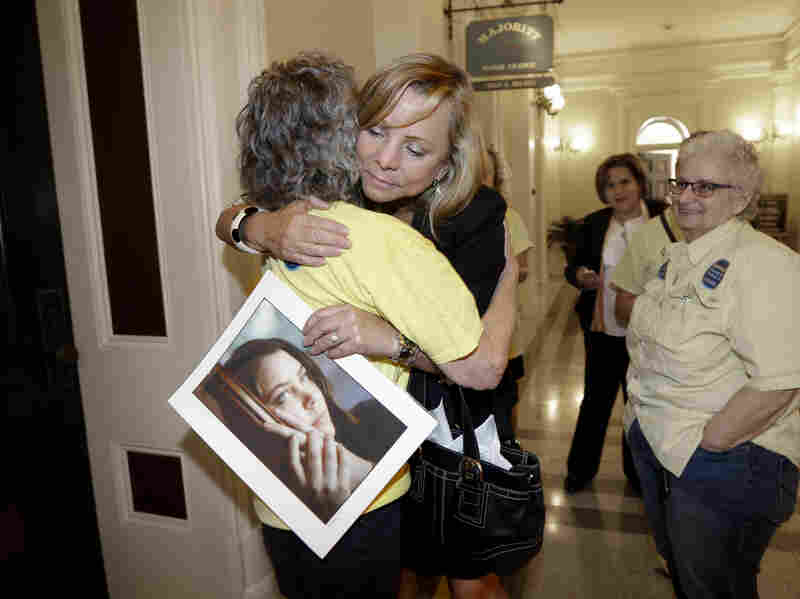Debbie Ziegler holds a photo of her daughter, Brittany Maynard, as hugs supporter Ellen Pontac after a right-to-die measure was approved by the state Assembly on Wednesday in Sacramento, Calif. Rich Pedroncelli/AP hide caption
itoggle caption Rich Pedroncelli/AP
A controversial bill to legalize physician-assisted suicide in California is headed to the governor for consideration, after almost nine months of intense — often personal — debate in the legislature.
If Gov. Jerry Brown signs the bill, California would become the fifth state to allow doctors to prescribe lethal medication to terminally ill patients who request it, after Oregon, Washington, Vermont and Montana.
“Our hope, our fervent hope, is that Gov. Jerry Brown will sign this bill and bring relief to hundreds of dying Californians,” said Toni Broaddus, state campaign director for advocacy group Compassion & Choices.
The California bill was modeled after the Oregon law. It requires two different doctors to determine that a patient has six months or less to live before prescribing the drugs. Patients must be physically able to swallow the medication themselves, and must have the mental capacity to make medical decisions.
Numerous additional safeguards were added to the bill in recent months to sway opponents, including a sunset clause that ends the law in 10 years. Patients must request the drugs three times to receive them — once in writing before two witnesses — and they must sign a form two days before ingesting the medication.
“I can assure you that the joint and co-authors on this bill … have endeavored to build in protections in this law that are stronger than the protections in any of the states where this has been practiced,” said Sen. Bill Monning, D-Carmel.
The bill continued to face fierce opposition, however, from religious groups and disability rights advocates. They are concerned that elderly and disabled people, especially those who are low-income, could be pressured into taking the drugs in order to end or avoid expensive, life-sustaining care. They fear the protections are not enough, and that family members or other heirs could slip the drugs to the patient without their knowledge or consent.
“The legislation effectively paints a target on the back of each and every elderly and disabled person in our state,” said Sen. Joel Anderson, R-San Diego, paraphrasing an elder abuse advocate. “The promises and assurances of the safeguards and protections from the representatives of those in favor are based in innocent ignorance.”
Opponents also criticized the procedure for getting the bill through the Legislature. During the normal legislative session, the bill stalled in the Assembly Health Committee when authors couldn’t get enough votes. Several Democrats from Southern California would not support it.
But proponents managed to navigate through that roadblock by re-introducing the bill during a special session on health care financing, where committee memberships were different. The bill passed the Assembly on Wednesday 44 to 35, and it passed the Senate on Friday 23 to 14.
Gov. Jerry Brown’s office also criticized the political pathway, saying the special session was not the appropriate venue for the physician-assisted suicide bill. But Brown has not indicated where he stands on the issue itself, nor whether he will sign or veto the bill. If he does nothing, after 30 days the bill will become law.
This story is part of a reporting partnership with NPR, KQED and Kaiser Health News.
This entry passed through the Full-Text RSS service – if this is your content and you’re reading it on someone else’s site, please read the FAQ at fivefilters.org/content-only/faq.php#publishers.
